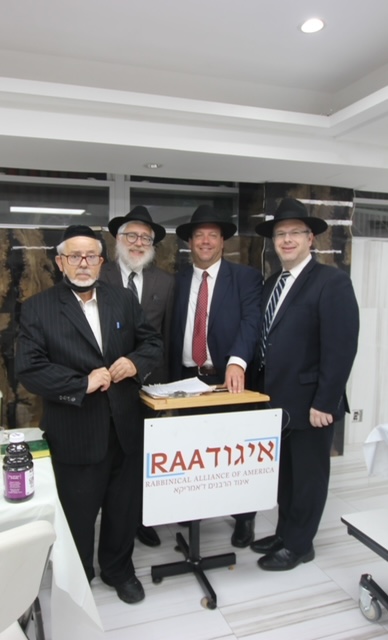Edited by: TJVNews.com
On Sunday, July 31, 2022, the Rabbinical Alliance of America/Igud HaRabbonim convened its Rosh Chodesh Av conference at the Ahi Ezer Yeshiva Congregation in Brooklyn, New York, where RAA Presidium Member, Rabbi Dr. Hanania Elbaz, serves as the rabbi. The Rosh Chodesh Av seudah was dedicated l’zecher nishmas Rabbi Shalom Elbaz, HaGaon HaChacham Shalom Ben HaGaon HaChacham Chayim Elbaz, Zt’l, father of Rabbi Dr. Hanania Elbaz and Rabbi Eliyahu Elbaz, rabbi of the Sephardic Lebanese Congregation of Brooklyn. In honor of his father’s Yahrzeit, Rabbi Hanania Elbaz delivered an erudite and scholarly lecture on the issue of waiting between dairy and meat and meat and dairy.
Rabbi David Toback opened the conference with the recitation of Psalm 31. Rabbi Yehoshua S. Hecht, presidium member of Rabbinical Alliance of America and rabbi of Beth Israel Chabad of Norwalk, Connecticut, spoke “of the importance of the RAA and its member rabbis to speak out on issues of morality and the Sheva Mitzvot Bnai Noach, the Noahide laws which are part and parcel of the Igud HaRabbonim’s platform.” Rabbi Hecht emphasized, “even if it means that our elected representatives will not listen to our point of view, we as rabbis have a moral obligation to speak our conscience. We never know how further down the line our voice may have a positive impact.”
Rabbi Yehuda Blank, director of programing, chaplaincy commission and external affairs, gave an update on his forthcoming plans of exciting programs for member rabbis of the Rabbinical Alliance of America. Rabbi Blank thanked Rabbi Shlomo Segal and Rebbetzin Adina Segal of Kehilat Moshe for Rebbetzin Segal’s assistance in organizing, and presentation during, the RAA dementia program that gives rabbis, chaplains, educators and rebbetzins important insight into the mental health area of dementia. Rabbi Blank said, “our goal is to provide important information so that our rabbis, chaplains, educators and rebbetzins can perform their higher calling with greater understanding of this important topic of dementia that sadly afflicts too many people. Knowledge is power and is key in developing a plan to handle these important life situations.”
Rabbi Mendy Mirocznik, executive vice-president of the Rabbinical Alliance of America, presented—at request of Rabbi Hannania Elbaz and on behalf of the RAA’s presidium—a resolution calling on all visitors to the Kotel, the Western Wall, to respect the traditional halachic practice of prayer. The proclamation passed unanimously. The following is the text of the proclamation:
The Rabbinical Alliance of America Calls for Maintaining the Sanctity and Dignity of the Kotel
The Rabbinical Alliance of America—Igud HaRabbonim, representing over 950 American rabbis—calls on people of all faiths and nationalities to maintain the respect and dignity of the Kotel, the Western Wall. According to sacred Jewish tradition the entirety of Israel is a Holy Land. However, certain holy sites are of special hallowed significance. The Western Wall, the Kotel, is the only remaining wall standing from the structure of the Second Temple in Jerusalem. Our Sages teach us that the Divine Presence, the Shechina, never departed from the Western Wall. Every year, millions of visitors to the Kotel show reverence and respect for the sanctity of the holy place.
Recently, protesters aggressively disrupted a non-traditional bar mitzvah service held at a side plaza at the Kotel. News commentators rightly objected to the aggressive nature of the protests that served to offend celebrants. The commentators failed to object to the non-traditional services held in a sacred space. Both acts, the celebration and the protest, failed to respect the dignity of the Kotel.
The Rabbinical Alliance of America welcomes everyone—Jews and gentiles, people of all denominations and faiths—to pray at the Kotel and calls on them to do so in a dignified way that respects those gathered to pray and respects Jewish tradition. Any prayer should be engaged within the framework of the separate Men’s and Women’s sections. Any protests should be done respectfully, attempting to reach out with love in a way that respects the dignity of others and encourages them to return to Jewish tradition.
Rabbi Mendy Mirocznik, executive vice-president of the Rabbinical Alliance of America stated, “as we approach Tisha B’av, the annual commemoration of the destruction of both the First and Second Temples in Jerusalem, we think about what we have lost as a people, both in terms of the Temple and its service and in terms of national unity. The Rabbinical Alliance of America calls on all people of good faith and good will to respect the traditions of Judaism and the sanctity of the Kotel by worshiping traditionally, i.e., always remaining within the bounds of Halacha, and by reaching out to others in a way that increases national unity and respect for Jewish tradition.”
Mirocznik further stated, “the Kotel should be a source of unity, respect and love among all Jews. Historically, the Kotel has been a source of inspiration and teshuvah, repentance, as representatives of traditional Judaism reach out to visitors from afar. Jews of all backgrounds from all over the world pray together at the Kotel, in a beautiful chorus that pierces the gates of heavens. When everyone prays according to Jewish tradition in this sacred place, we all pray together. When groups choose to bring non-traditional practices to the Kotel, it divides us as a people in the place that, more than others, should inspire unity. Non-Halachic prayer services at the Kotel offend the sanctity of the holy place, the unity of the Jewish people and the inspiration of the sole remnant of the Temple. The response to these improper practices at the Kotel must be reaching out with love, trying to bring our brothers and sisters to appreciate the sanctity of the Kotel and the importance of Jewish unity. It is of utmost importance that our response to non-Halachic prayer services show our concern for sanctity, tradition and Jewish unity. We pray for the rebuilding of the Temple when we all will worship together in a traditional way.”



